Key takeaways:
- The author’s transition from Ruby to Elixir was driven by the need for better performance, scalability, and the appeal of functional programming principles.
- Elixir’s fault tolerance and supervision trees provide remarkable reliability, allowing applications to recover gracefully from errors.
- The community support and rich ecosystem of libraries in Elixir facilitated a smoother learning experience compared to Ruby.
- Challenges during the transition included adjusting to immutability, the unfamiliarity of the Actor model for concurrency, and adapting to Elixir’s tooling and ecosystem.
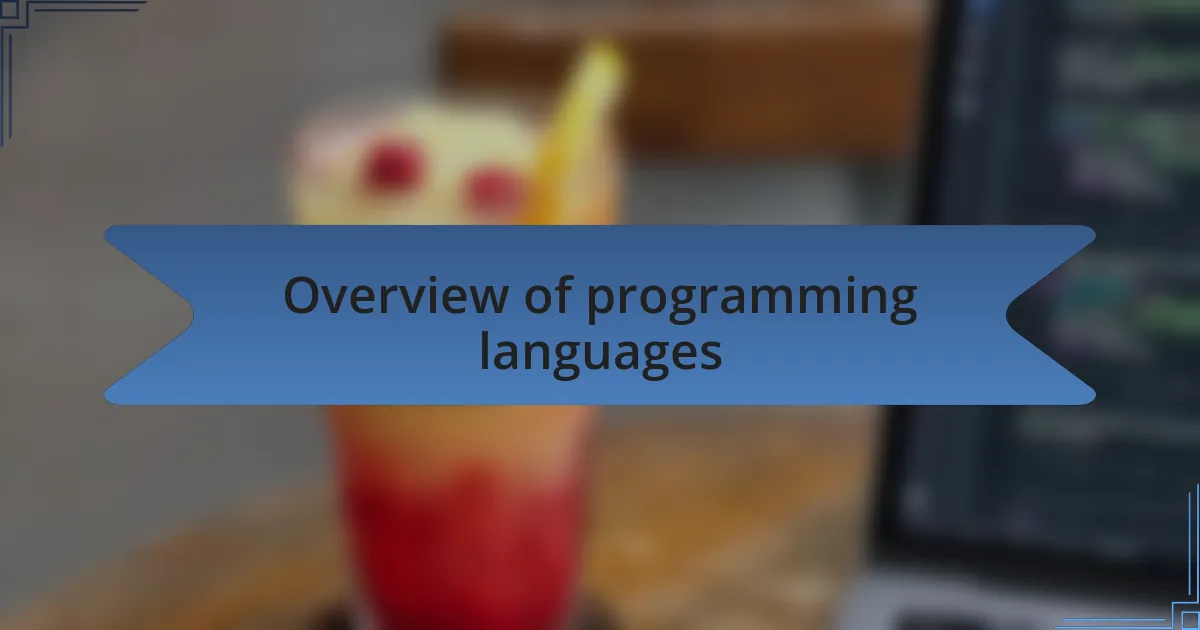
Overview of programming languages
Programming languages are the backbone of software development, each offering unique advantages and philosophies. Take Ruby, for instance; its elegant syntax and focus on developer happiness resonated with me profoundly when I first started. I remember the satisfaction of crafting clean and concise code, which felt almost poetic at times.
Then, there’s Elixir, which embraces functional programming and concurrency. When I switched to Elixir, I was intrigued by how it changes the way you think about problems. Have you ever experienced that moment when you realize a new way to approach your work? That’s how I felt diving into Elixir’s model; it was a refreshing shift that pushed me to reconsider traditional methods.
Every language has its quirks and community, shaping the overall experience for developers. As I navigated different frameworks and libraries, I found that each programming language carried not just technical differences, but also cultural aspects that enriched my journey. Looking back, it’s fascinating how our choices in languages can reflect our personal preferences and values as developers.
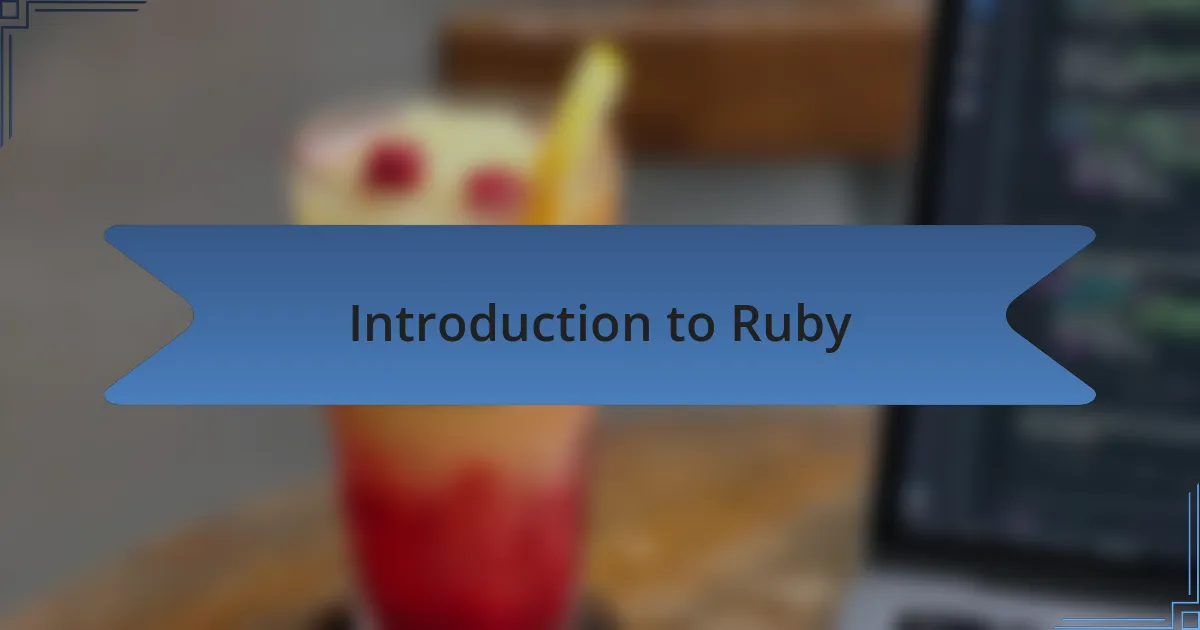
Introduction to Ruby
Ruby, created in the mid-1990s by Yukihiro Matsumoto, quickly gained traction thanks to its focus on simplicity and productivity. I distinctly remember my first encounter with Ruby on Rails—a web application framework that epitomized convention over configuration. That “aha!” moment when I realized how quickly I could build a functional web app brought a sense of joy that kept me coming back for more.
One of the aspects I loved most was Ruby’s emphasis on readability; it often felt like writing in plain English. This clarity not only made it easier for me to communicate with fellow developers but also helped me onboard newcomers effortlessly. Have you ever shared code with someone and watched their confusion dissipate as they grasped the logic? That’s the kind of camaraderie Ruby fosters.
The Ruby community is another fascinating layer to this experience. So many passionate developers contributed to rich libraries and gems that extended the language’s capabilities. I remember attending a local meet-up filled with vibrant discussions and the infectious energy that surrounded learning and sharing. I realized that the connections I formed were just as invaluable as the technical skills I was acquiring.
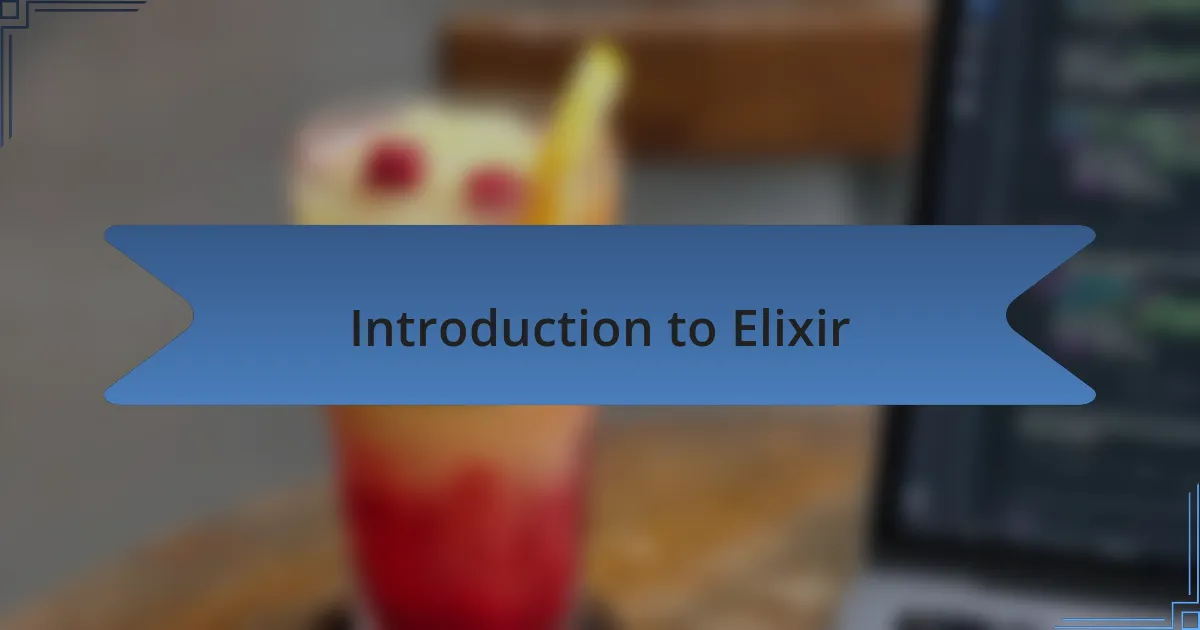
Introduction to Elixir
Elixir, born out of the need for a highly concurrent and fault-tolerant programming language, emerged in 2011, and I must say, its functional programming paradigm is a refreshing shift from my Ruby experience. I distinctly recall the moment I first grasped how Elixir handles processes—it’s like stepping into a new world where lightweight processes communicate without fear of crashing. Have you ever felt the thrill of seeing how elegantly concurrency can be managed?
One of the things that struck me was Elixir’s seamless integration with the Erlang virtual machine. This foundation provides a reliability and scalability that I found incredibly appealing, particularly when considering the demands of modern web applications. I still remember the satisfaction of deploying my first Elixir application, where I didn’t just feel accomplished but also secure in knowing that it could handle unexpected traffic with ease.
As I delved deeper into Elixir, the community quickly became a significant part of my journey. The support I found was unparalleled; engaging in discussions on forums and social media made me feel connected with other developers eager to explore this vibrant language. This sense of belonging reminded me of those early days with Ruby, where sharing successes and learning from challenges enriched my coding life significantly. What I realized is that it’s not just about the language itself; it’s about the relationships and shared experiences that form the foundation of our learning.
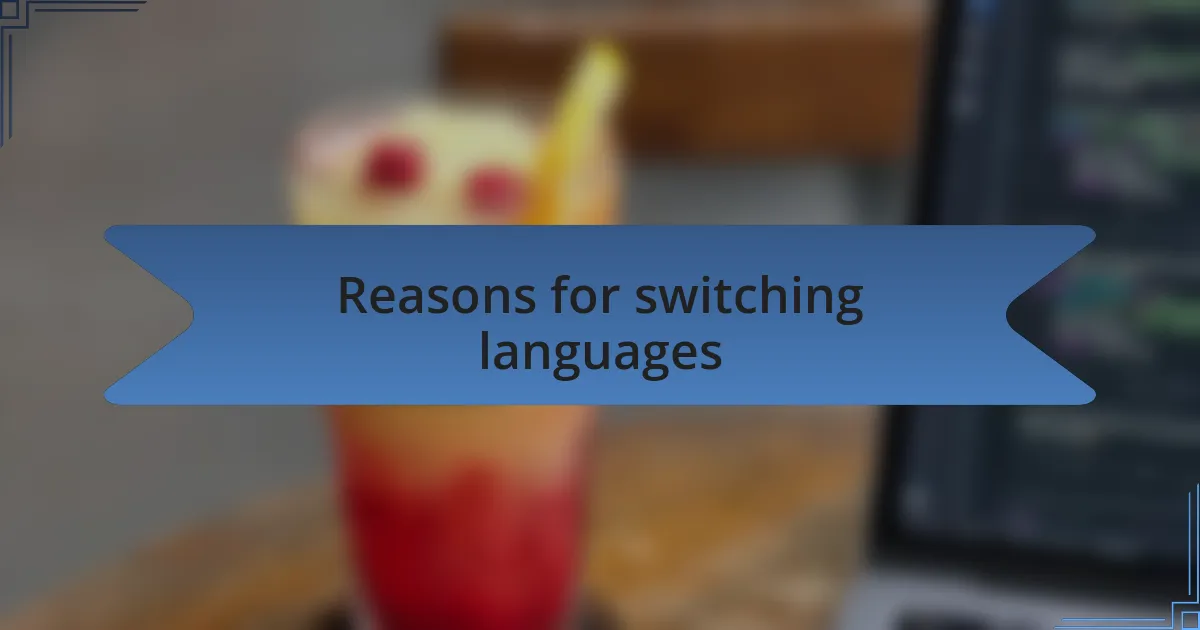
Reasons for switching languages
Switching languages often stems from a desire for performance and scalability. After working extensively with Ruby, I found myself facing challenges with performance during traffic spikes. It was a critical moment when I realized that Elixir’s lightweight processes could elegantly manage concurrent operations. Have you ever been in a situation where you wished your application could handle more load? That realization drove my transition towards Elixir.
Another pivotal reason for my switch was the embrace of functional programming principles in Elixir. I vividly remember the moment I first understood immutable data—everything just clicked. It felt liberating not to worry about side effects in my code. This shift not only made debugging easier but also fostered a more predictable coding environment. Have you ever considered how much easier life could be with fewer surprises in your code?
Lastly, I was drawn to community support and robust libraries associated with Elixir. While Ruby had its strengths, I often found myself hunting for solutions that weren’t readily available. In contrast, I was amazed by the wealth of resources and examples in Elixir’s ecosystem. The excitement of discovering new libraries, like Ecto for database interactions, reassured me that I was part of a thriving community, eager to innovate and collaborate. Isn’t it refreshing to feel supported by a community that shares your passion?
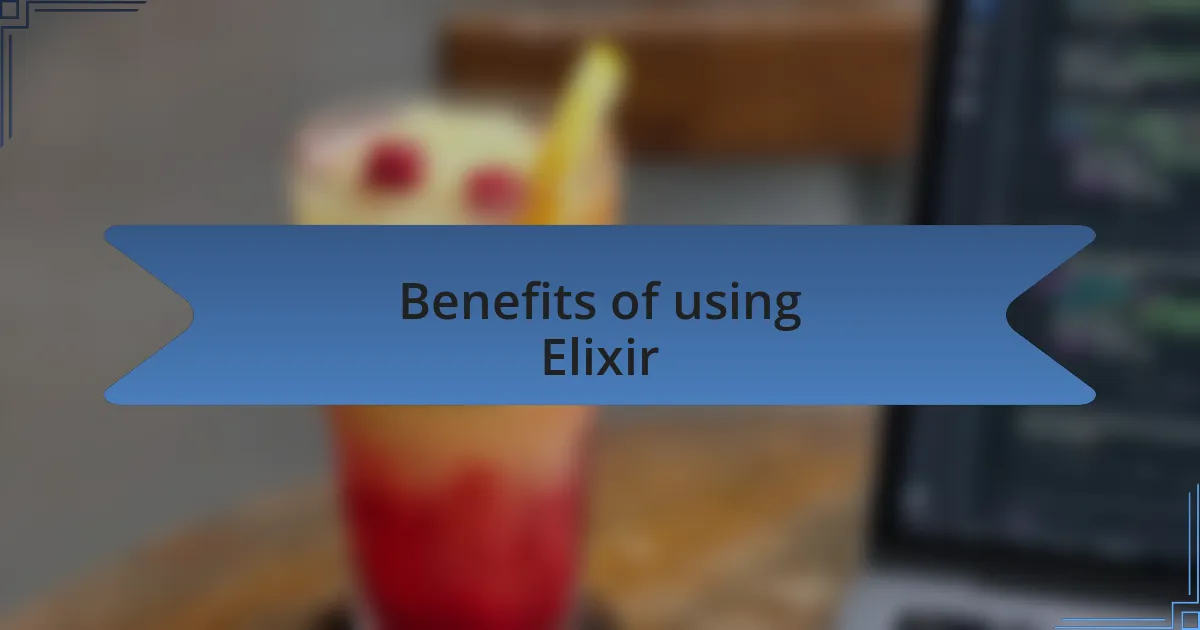
Benefits of using Elixir
One of the most striking benefits of using Elixir has been its remarkable fault tolerance. There was a moment when my application experienced an unexpected crash while handling multiple requests. What shocked me was how Elixir’s supervision trees allowed the system to recover gracefully, restarting only the failed parts without affecting the entire application. Have you ever wished your app could recover from errors without causing massive disruptions? That experience underscored Elixir’s power in maintaining uptime and reliability.
Another compelling aspect of Elixir is its elegant syntax and readability. I remember diving into a new project and feeling instantly at home with the clean and straightforward nature of the language. Unlike the sometimes complex syntax of Ruby, Elixir’s functional approach allowed me to articulate ideas in a way that felt almost poetic. Isn’t it amazing when code can be both easy to understand and beautiful? This has not only improved my productivity but also made it easier to onboard team members who are new to the language.
The concurrency model in Elixir is something that I can’t overlook. During my first project using Elixir, I utilized its Actor model for handling real-time features, and the performance blew me away. I felt a sense of empowerment knowing that I could easily scale my applications to handle thousands of simultaneous users without breaking a sweat. How remarkable is it that you can build such powerful solutions with less effort when leveraging a language’s design? That sheer potential is one of the main reasons I now advocate for using Elixir in any new development endeavor.
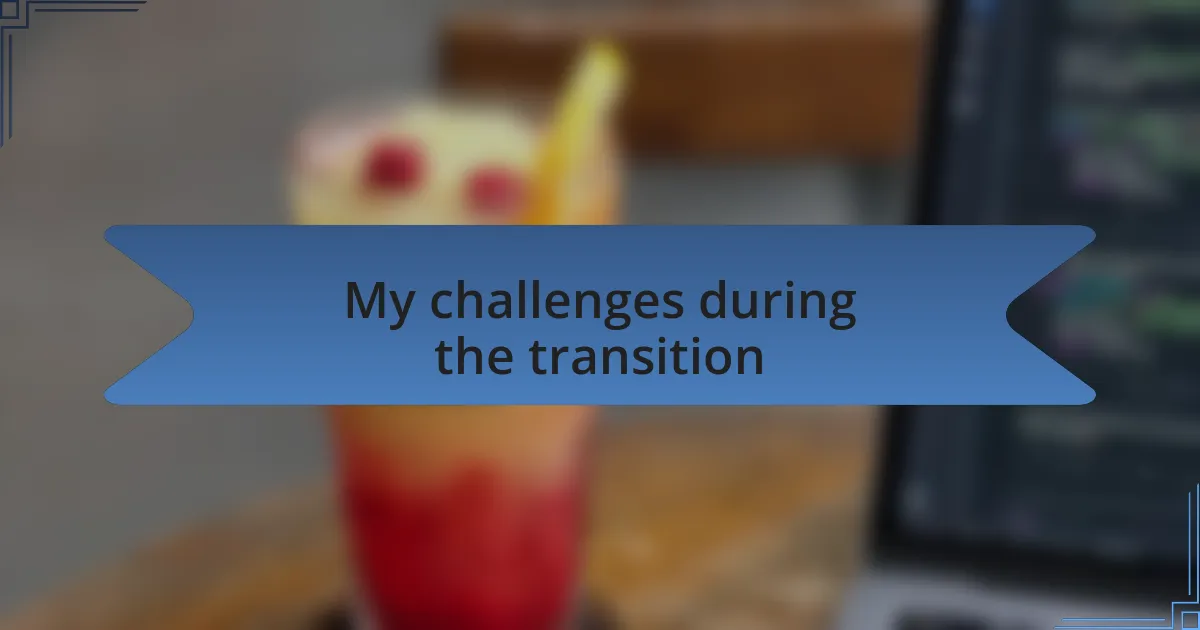
My challenges during the transition
Transitioning from Ruby to Elixir was not without its hurdles. I vividly remember the initial struggle with Elixir’s immutability. After years of comfortable mutability in Ruby, adjusting my mindset to embrace immutable data structures felt like trying to learn a new dialect. Did I ever get frustrated when simple tasks became multi-step processes? Absolutely! But this challenge ultimately deepened my understanding of functional programming.
Another significant challenge was the shift in my thinking about concurrency. While Ruby uses threads and other constructs that are familiar, Elixir’s Actor model felt foreign at first. I distinctly recall a moment where I mismanaged process communication during a project, leading to unexpected crashes. It was a disheartening experience, but it pushed me to learn the powerful abstractions Elixir offers. Have you ever faced a steep learning curve that turned into a pivotal breakthrough? That’s exactly what I experienced.
Lastly, adapting to the tooling and ecosystem around Elixir posed its own set of challenges. Coming from the rich Ruby on Rails environment, I felt somewhat lost at first without frameworks that were as expansive. When I tried to build a simple web application in Phoenix, I experienced hiccups along the way that tested my patience. However, those moments of confusion morphed into insights as I gradually discovered the unique conventions and strengths of Elixir’s ecosystem. Isn’t it fascinating how obstacles can drive us to explore new paths?